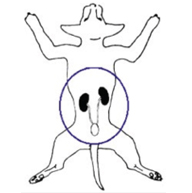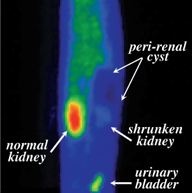Renal scintigraphy is a valuable tool for evaluating kidney function in dogs and cats. With this imaging procedure, one can determine the glomerular filtration rate (GFR), the most accurate way to assess renal function and detect early kidney disease.
While diagnostic radiology and ultrasonography are the best methods for examining the anatomic details of the kidney, they cannot measure kidney function. Blood and urine tests can assess overall kidney function, but they cannot differentiate between the function of one kidney versus another. The strength of renal scintigraphy over these other techniques is that it can measure both individual kidney function and total kidney function (GFR) in the awake dog or cat.

Schematic drawing of the normal location of the kidneys and urinary bladder. The blue circle represents the gamma camera’s view.
Renal scintigraphy is most commonly used to determine individual kidney function prior to renal surgery (nephrotomy or nephrectomy). In these situations, it is essential that the surgeon know whether the animal’s other kidney will have enough function remaining to support life post-operatively. If the remaining kidney function cannot support life, surgery may not be a viable option. Renal scintigraphy can also identify and monitor conditions such as infections, tumors, cysts, kidney stones, or injury from toxins and poisons.
The protocol for renal scintigraphy requires that the patient lie on their side for about 10 minutes as the radiopharmaceutical is injected and the images of the kidney are acquired. By measuring the amount of radiopharmaceutical taken up by each individual kidney, we can determine the GFR for each of the patient’s kidneys. The renal scan does not require sedation or anesthesia, so it is a very safe procedure.

Composite image of a cat showing the uptake of the radionuclide into the normal left kidney. The small, poorly functional right kidney is also visualized within a large peri-renal cyst.
